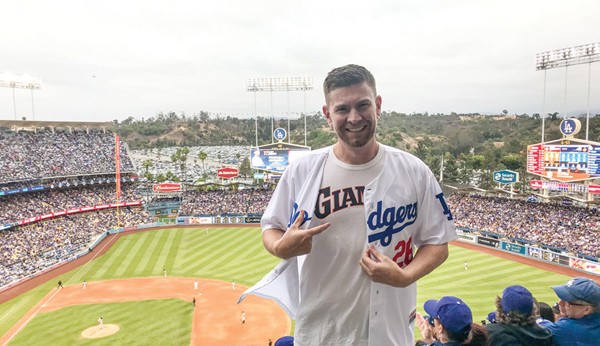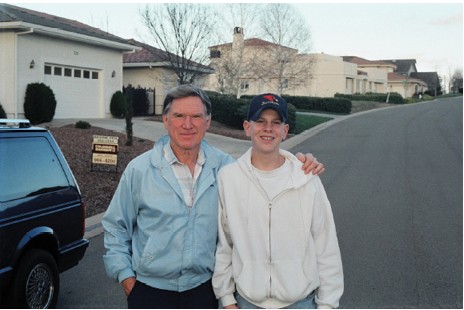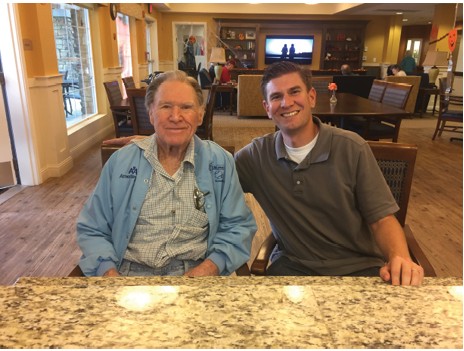It’s a Red Adams Jersey, Not a Dodgers Jersey
This article was written by Zak Ford
This article was published in Dodger Stadium: Blue Heaven on Earth (2024)
Giants fan Zak Ford wore his Red Adams jersey to Dodger Stadium in 2018. (Courtesy of Zak Ford)
Dodger Stadium is a special place for me. While this statement isn’t unique, I feel conflicted making it as a Giants fan.
I have a divided extended family. My grandma had pumped blue blood since listening to Vin Scully call Dodger games from Brooklyn. For some reason, my dad chose the Giants, and his preference was passed down to me.
My conflict grew deeper as a teenager when I befriended Red Adams. Adams was a “baseball lifer” whose career included 33 years with the Dodgers in numerous scouting and coaching roles. He spent 12 seasons as the team’s pitching coach, 1969-1980, when the Dodgers won three pennants and six team ERA titles. I found his baseball résumé very impressive. However, I found who he was as a man even more impressive.
I met Adams through my great-uncle, Larry Powell. Larry and Red were teammates with the Los Angeles Angels of the Pacific Coast League in 1947 and 1948 and kept in touch. Since I loved baseball and lived relatively close to Red, Larry suggested I reach out to him. Red was always very accommodating. We talked on the phone occasionally, regularly traded letters, and I was a guest at his home multiple times. We often joked about our preferred teams. Early conversations focused on baseball, but as I got older, they evolved into more important life topics.
For nearly a decade, while I began my career and started my family, we lost regular contact. We spoke by phone in mid-2015, and that fall his birthday card was returned. I attempted a call in early September of 2016, but his number was disconnected.
Shortly after, on the evening of Friday, September 23, 2016, I watched Vin Scully Weekend festivities begin at Dodger Stadium while at my house in Northern California. I was overcome with emotions thinking of my late grandma’s love for the Dodgers, and Red’s deep ties to the team. That night I decided to make the journey to Dodger Stadium for Scully’s last two games in Los Angeles. For some reason, I brought one of my most prized possessions – Red’s 1980 game-used home jersey.
I arrived at Dodger Stadium and was quickly caught up in my surroundings. For the first time in my life, I put on Dodgers apparel. However, I told myself it wasn’t as much of a Dodgers jersey as it was a Red Adams jersey. I also figured it was a fitting way to retire the jersey and say goodbye to Red, as I never expected to see him again.
Being at Dodger Stadium for Scully’s last two home games will always remain among my top baseball memories. The appreciation for one of baseball’s all-time greatest ambassadors superseded any team affiliation that weekend. I could feel the presence of baseball gods when Scully’s final call before the home crowd was a walk-off homer in the 10th inning by Charlie Culberson. The ball landed in the Dodgers bullpen, where Red spent much of his time. Despite the homer clinching the National League West, I could instantly appreciate the moment. When Scully took the microphone and said goodbye to the Dodger Stadium crowd, I cried.
Upon returning from that nostalgic and emotional Dodger Stadium trip, I decided I’d attempt to track Red down, despite how unlikely my success would be. After a few days of online searches and calls, I connected with his oldest daughter, who informed me he was in an assisted-living and memory care home in Fresno.
I am thankful that in the last three months of his life, we enjoyed four visits. Despite not remembering many details of his baseball career, Red was the same man. He hadn’t lost his sense of humor nor his welcoming nature and ability to lift everyone around him up with his encouraging personality. I was able to thank him for the positive impact he had on my life and even introduce him to my wife and kids. During those visits, we didn’t talk much about his experiences in baseball. That was no longer important. We talked about what was important to him at his core as a man.
After his passing in early 2017, I decided that wearing a Red Adams jersey at Dodger Stadium would become an annual tradition. I call it my annual “It’s a Red Adams Jersey, Not a Dodgers Jersey” game. Crediting my year as a cutout in 2020, I haven’t missed a season.
Zak Ford first met Red Adams in the winter of 1993. (Courtesy of Zak Ford)
While I haven’t experienced anything quite as magical as that first 2016 trip, each visit creates another special memory of Dodger Stadium. More importantly, each visit rekindles old memories of Red.
Red Adams, 1921-2017, was a professional baseball pitcher, scout, and pitching coach. Adams pitched 19 seasons professionally (1939-1942, 1944-1958), before a long scouting and coaching career with the Dodgers (1959-1991).
As a minor-league pitcher, primarily in the Pacific Coast League, Adams compiled a 179-172 record. He posted his best record, 21-15, in 1945 with the Los Angeles Angels, which resulted in a promotion to the Chicago Cubs the following year. He saw only brief big-league action, posting a 0-1 record over eight games in relief during the 1946 season. At the time of his passing, he was the oldest living Cub.
Zak Ford enjoys a visit with Red Adams at a Fresno assisted-living home in 2016. (Courtesy of Zak Ford)
After his playing days, Adams spent 33 years with the Dodgers, 1959-1991, in numerous scouting and coaching roles. His time with the Dodgers included 12 seasons as their pitching coach, 1969-1980. In seven seasons (1972-1978), the Dodgers led the National League in ERA six times (1972-1975, 1977-1978). During this time, the Dodgers won three pennants (1974, 1977, 1978). He was praised by many Dodgers pitchers for his coaching abilities. In Don Sutton’s Hall of Fame induction speech, he stated, “Red Adams is the standard by which every pitching coach should be measured. No person ever meant more to my career than Red Adams. Without him, I wouldn’t be standing in Cooperstown today.”
In 2019 Red’s grandson, Eric Adams, self-published the book Red and Blue, which details Red’s life and career, and includes insights from numerous prominent Dodgers figures. The book is available through Amazon.
ZAK FORD is chair of the Dusty Baker-Sacramento SABR Chapter and serves on the advisory committee of the Pacific Coast League Historical Society. He is the author of Called Up: Ballplayers Remember Becoming Major Leaguers. Ford lives in Cameron Park, California.




